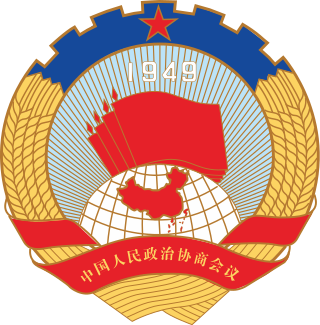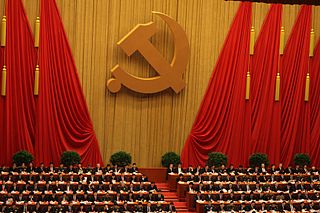
The Chinese People's Political Consultative Conference (CPPCC) is a political advisory body in the People's Republic of China and a central part of the Chinese Communist Party (CCP)'s united front system. Its members advise and put proposals for political and social issues to government bodies. However, the CPPCC is a body without real legislative power. While consultation does take place, it is supervised and directed by the CCP.

Jia Qinglin is a retired senior leader of the People's Republic of China and of the ruling Chinese Communist Party (CCP). He was a member of the CCP's Politburo Standing Committee, the party's highest ruling organ, between 2002 and 2012, and Chairman of the National Committee of the People's Political Consultative Conference between 2003 and 2013.

The National Congress of the Chinese Communist Party is a party congress that is held every five years. The National Congress is theoretically the highest body within the Chinese Communist Party (CCP). Since 1987 the National Congress has been held in the months of October or November. The venue for the event, beginning in 1956, is the Great Hall of the People in Beijing. The Congress is the public venue for top-level leadership changes in the CCP and the formal event for changes to the Party's Constitution. In the past two decades the National Congress of the CCP has been pivotal at least as a symbolic part of leadership changes, and therefore has gained international media attention.

The 16th National Congress of the Chinese Communist Party was held in Beijing between November 8 and 14, 2002. It was preceded by the 15th National Congress and was succeeded by the 17th National Congress. 2,114 delegates and 40 specially invited delegates represented the party's estimated 66 million members.
During the first five years of the People's Republic of China, the Central People's Government of the People's Republic of China served as supreme organ for exercising state power when the National People's Congress was not in session, as determined by the Chinese People's Political Consultative Conference.

Yu Zhengsheng is a retired Chinese politician who served as the chairman of the Chinese People's Political Consultative Conference (CPPCC) from March 2013 to 2018. Between 2012 and 2017, Yu was the fourth-ranking member of the Politburo Standing Committee of the Chinese Communist Party.
The 16th Politburo of the Chinese Communist Party (CCP), formally the Political Bureau of the 16th Central Committee of the Communist Party of China, was elected at the 1st Plenary Session of the 16th Central Committee of the CCP on 15 November 2002 in the aftermath of the 16th National Congress. This electoral term was preceded by the 15th Politburo and succeeded by the 17th. Of the 24 members, nine served in the 16th Politburo Standing Committee.
The 16th Central Committee of the Chinese Communist Party was in session from 2002 to 2007. It held seven plenary sessions. It was set in motion by the 16th National Congress of the Chinese Communist Party. The 15th Central Committee preceded it. It was followed by the 17th Central Committee of the Chinese Communist Party.
The 15th Central Committee of the Chinese Communist Party was in session from 1997 to 2002. The 14th Central Committee preceded it. It was followed by the 16th Central Committee of the Chinese Communist Party. This was the first Central Committee that current CCP general secretary Xi Jinping was elected to, as an alternative member.

The 18th National Congress of the Chinese Communist Party was held November 8-15, 2012 at the Great Hall of the People. It was preceded by the 17th National Congress of the Chinese Communist Party. Due to term limits and age restrictions, seven of the nine members of the powerful Politburo Standing Committee (PSC) retired during the Congress, including Hu Jintao, who was replaced by Xi Jinping as General Secretary of the Chinese Communist Party. The Congress elected the 18th Central Committee of the Chinese Communist Party, and saw the number of Politburo Standing Committee seats reduced from nine to seven. It was succeeded by the 19th National Congress of the Chinese Communist Party.

The chairman of the National Committee of the Chinese People's Political Consultative Conference is the leader of the National Committee of the Chinese People's Political Consultative Conference (CPPCC), which is a political advisory body in the People's Republic of China.

The National People's Congress (NPC) is the highest organ of state power of the People's Republic of China. The NPC is the only branch of government in China, and per the principle of unified power, all state organs from the State Council to the Supreme People's Court (SPC) are subservient to it. With 2,977 members in 2023, it is the largest legislative body in the world. The NPC is elected for a term of five years. It holds annual sessions every spring, usually lasting from 10 to 14 days, in the Great Hall of the People on the west side of Tiananmen Square in Beijing.
Shi Taifeng is a Chinese politician currently serving as the head of the United Front Work Department (UFWD) of the Central Committee of the Chinese Communist Party (CCP) and the first-ranking vice chairperson of the Chinese People's Political Consultative Conference (CPPCC). He is additionally a member of the CCP Politburo and a secretary of the CCP Secretariat.

The secretary-general of the National Committee of the Chinese People's Political Consultative Conference is a political office in the People's Republic of China. The secretary-general heads the General Office of the National Committee of the Chinese People's Political Consultative Conference (CPPCC), which is a political advisory body in the People's Republic of China.

The 20th National Congress of the Chinese Communist Party (CCP), commonly referred to as Èrshí Dà, was held in the Great Hall of the People, Beijing from 16 to 22 October 2022. The National Congress is the highest organ of the party, and is stipulated to be held every five years. The conference had 2,296 delegates and 83 specially invited delegates.
The 2023 National People's Congress, officially the First Session of the 14th National People's Congress, was held in March 2023 at the Great Hall of the People in Beijing, China. The session opened on 5 March and concluded on 13 March. Major state positions of China were elected in this session.
The 18th Politburo Standing Committee, formally the Standing Committee of the Political Bureau of the 18th Central Committee of the Communist Party of China, was elected by the 1st Plenary Session of the 18th Central Committee on 15 November 2012, in the aftermath of the 18th National Congress of the Chinese Communist Party (CCP). It was preceded by the CCP's 17th Politburo Standing Committee and was succeeded by the 19th in 2017.

The 14th National Committee of the Chinese People's Political Consultative Conference is the current meeting of the top political advisory body of the People's Republic of China. It convened in Beijing, on 4 March 2023, and is scheduled to continue until March 2028.

The 13th National Committee of the Chinese People's Political Consultative Conference was the meeting of the top political advisory body of the People's Republic of China. It convened in Beijing on 3 March 2018 and ended on 4 March 2023.

The 1st National Committee of the Chinese People's Political Consultative Conference was the first meeting of the top political advisory body of the People's Republic of China. It convened in Beijing on 21 September 1949 and ended on 21 December 1954. During this period, it exercised legislative powers on the behalf of the National People's Congress, which was not yet established.








